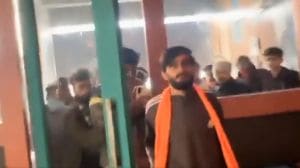The Rights Angle
Screen investigates a sore-point that has created cacophonous discordance in the world of Hindi film music
A landmark verdict by the Kolkata High Court on the use of the song Apni to jaise taise from Laawaris in the recent film Housefull has spotlighted a festering copyright issue yet again. Screen investigates a sore-point that has created cacophonous discordance in the world of Hindi film music
The chronology of events
The Mika-rendered song Aap ka kya hoga Dhanno as mentioned on the album inlay of Houseful and credited to Shankar-Ehsaan-Loy and Sameer was,in part,a re-creation of the super-hit song composed by Kalyanji-Anandji and written by Prakash Mehra in the 1981 Laawaris. A section of the song was added to an original composition and filmed in the 2010 film Housefull on Akshay Kumar,Riteish Deshmukh and others.
Within days of the album hitting the market,composer Anandji and the late Kalyanjis heirs sent notices to Sajid Nadiadwala,Eros International,T-Series and Saregama on March 31 for not having taken permission/licence to use the formers original musical work,to which Saregama and T-Series responded that Saregama earlier HMV had all the rights and had licensed the same to T-Series and that no rights vested with the author Prakash Mehra,lyricist,composers Kalyanji-Anandji and also the film producer Prakash Mehra again. They claimed that Mehra had given them all rights to the music. Producer Sajid Nadiadwala and the distributors Eros International did not respond to this notice.
Puneet Mehra,son of the late Prakash Mehra who wrote the song and produced and directed the 1981 Amitabh Bachchan blockbuster,also started legal proceedings against Sajid Nadiadwala,and prior to filing a suit,Kalyanji-Anandjis counsel also asked for an examination of the documents assigning the claimed rights. No such documents were sent,instead Saregama filed a case in Kolkata High Court where an ex-parte injunction was brought in before any suit was filed by the composers.
Despite all this,the Kolkata High Court brought a stay on the use of the song within Housefull on April 30,the day of released worldwide with around a 1000 prints. The producers pleaded with the trial court,seeking two days for executing the said order. But on May 3,instead of doing this,Saregama and the producer filed an appeal in the Appellate Court,for getting an injunction for a stay on the April 30 order. The film continued to screen the song.
The landmark verdict
However,in a landmark verdict with far-reaching repercussions,the Division Bench of the Kolkata High Court on May 14 allowed the use of the song in the film subject to Eros International furnishing a Rs 50 lakh bank guarantee in favour of the Mehras and Rs 25 lakh in favour of the composers of the original song and not permitting the use of this song in any further prints of the film that will be made,until the final hearing. The matter,to quote the official court bulletin,The Baramp;Bench News Network,is now posted for final hearing.
We composers have taken heart from the fact that the courts have expressly recognised the rights of the music composer as one who must be given his due, notes veteran Anandji. Adds Ramesh Shah,late veteran Kalyanjis son,The landmark judgment by the Kolkata High Court has held that the right to license the copyright of a song is restricted only for the film for which the license has been taken and cannot be deemed to extend to another movie,In the present case,it was held that for the song Apni to jaise taise,Saregama cannot claim to have the right to grant the license for use of the original song from Laawaris to the different film Houseful simply because it has acquired audio rights from the original producers.
Adds composer Viju Shah,also Kalyanjis son,This decision comes as a significant boost to legendary composers and lyricists in particular who were being exploited by music companies who would take limited rights from the producers and vest with themselves rights of the creators of the music,far beyond what the film producers themselves would have!
Fresh hope now cheers all creators of original music in the film industry,particularly the gifted but out-of-work names and their families struggling to survive in todays times who do not have the money power or the ability to fight for their moral and legal rights.
Says Anandji,The Copyright Act,though passed with the objective of protecting the original creators of musical works,had been misused by recording companies to wrongfully enrich themselves at the cost of the lyricists and music composers. The Copyright Act clearly provides that unless specifically assigned in writing,the rights in the original creation would belong to the lyricists and music composers. Adds Ramesh,Even the right of the films producer is restricted to the use of the song within the film for which it was created.
Ignorance unlimited
Veteran lyricist Sameer,who has worked on Housefull,says that ignorance on the part of composers and lyricists as well as ambiguity in the Indian version of the Copyright Act has allowed the misuse of the existing provisions and prevented correction or amendment of the gray areas. This is responsible for the current scenario, he says. It is too simplistic to state that,for example,that I should have refused to be involved with the song. No one is really clear in India about the guidelines. There are claims and counter-claims. Even some top producers are unaware of the whole issue. The music directors and lyricists are now finally seeking a major amendment that makes everything crystal-clear and we are aiming for a Bill being passed in Parliament. The struggle is going on for very long and we hope that things get clear soon,which will put an end to all the unclear zones. However,one thing stands out 8211; the money involved is incredibly high,a lot of it is blocked and not reaching the authors lyricists and composers,and very simply,if they want us to believe that the creators of a song have no rights over them anyway,why have they taken signatures from many of the struggling oldtimers on letters that say that they are relinquishing all rights to the music companies?
The bigger picture
Music director Aadesh Shrivastava,who is in the forefront of the team fighting over this larger copyright issue along with Javed Akhtar and others,is more forthright. Our opponent lobby claims that songs are only created by us whereas the rest of the efforts are done and moneys spent by everyone else from the music company to the producer and star. My only point to them is: make a film without songs and prove that we and our contribution do not matter!
As Rajesh Roshan put it once,In the West,a major artiste can afford to buy islands by composing one,two or three chartbusters in a lifetime. Look at how we film composers make dozens or hundreds of hit songs over decades and are nowhere in comparison!
The answer lies in the foolproof Copyright laws that exist in most of the countries. Here the matters are in a way confounded further by the existence of IPRS,a body specially formulated to dole out royalties when dues to Indian artistes accumulated overseas and India also needed to pay the same to international artistes. But here too there are gray areas.
The loopholes are many,explains a veteran composer,who reveals how a song of his was used in a new film by the latter movies producers placing a small,barely noticeable ad in a small-town newspaper,asking any rights owners to come forward if they had a claim on this intellectual property! It became a technical legal point where they claimed that we did not respond so they went ahead. In that case,they were legally safe!
Anandji mentions the ambiguity over the Indian interpretation of the Copyright Act as the reason why his late brothers heirs and he have not received due royalty for the use of their songs Ae naujawan hai sab kuchh yahaan Apradh and Yeh mera dil Don as the base for the Grammy-winning soundtrack Dont phunk with my heart by the rap group Black-Eyed Peas. The group did pay royalties from their side,gave us and the late lyricist Indeewar due credit and even invited and felicitated me! he notes wryly. But the money has yet to reach us!
The proposed Amendment will be the true solution,and the creative fraternity is trying for a comprehensive change that will benefit every creative person even outside the film industry,just as it is in the West. First mooted under the earlier Central Government,the present one has promised to look into the matter swiftly and in a just manner.
Credits and more
On a radio show a decade ago,half the entries to a contest asking which to which film the chartbuster Chura liya hai tumne Yaadon Ki Baraat stated that it was from an album that featured the remixed song!
This brings into focus the issue of due credit,another aberration that is rampant in most cases of both re-works and sometimes even the original songs issued in compilations. There is no mention of original creators in more cases than where due mention is made,including in Housefull.
The existing Copyright Act clearly asks for a compulsory credit-line,notes Viju. There is,interestingly,also reason to believe that Shankar-Ehsaan-Loy had composed a completely original song here,but director Sajid Khan found the track just okay and felt the need for a chartbuster and thats when they decided to blend the Laawaris mega-hit into it!
Thunders Aadesh,The work of legends like Kalyanji-Anandji have stood the test of time. Can anybody from todays generation compose such magnificent melodies? Everyone is aware that songs like Bachna ae haseeno Hum Kisise Kum Naheen,Aa dekhen zaraa Rocky,Khaike paan banaraswala Don,Babuji dheere chalna Aar Paar and Ek hasina thi Karz have appeal that can never fade even in their re-created versions.
And that brings us to another existing provision that very few are aware about: that the original creators,even after licensing/assigning the use of their creations,can restrain the works from coming in the market if they feel that their creation has been distorted,and that this right to decide this rests solely with the original creators.
Admits Pritam,I am using two R.D.Burman tracks,Duniya mein logon ko Apna Desh and the single line Monica o my darling from Piya tu Caravan for a song in Once Upon A Time In Mumbaai and I was unaware of the reworking angle. I will look into this now. However,I have neither worked on Jab chhaye mera jadoo Lootmaar which was used in Hattrick nor on Aa dekhen zara in the film of that name. I am also not doing the two Bappi Lahiri hits from Disco Dancer for Golmaal 3.
Clearly,as Viju Shah puts it,A lot still needs to be done and greater public awareness of such laws is needed,so that writers and composers who spend the better part of their creative life in producing good literary works live to also enjoy its fruits in later years,instead of being exploited by commercial market forces.
- 01
- 02
- 03
- 04
- 05































